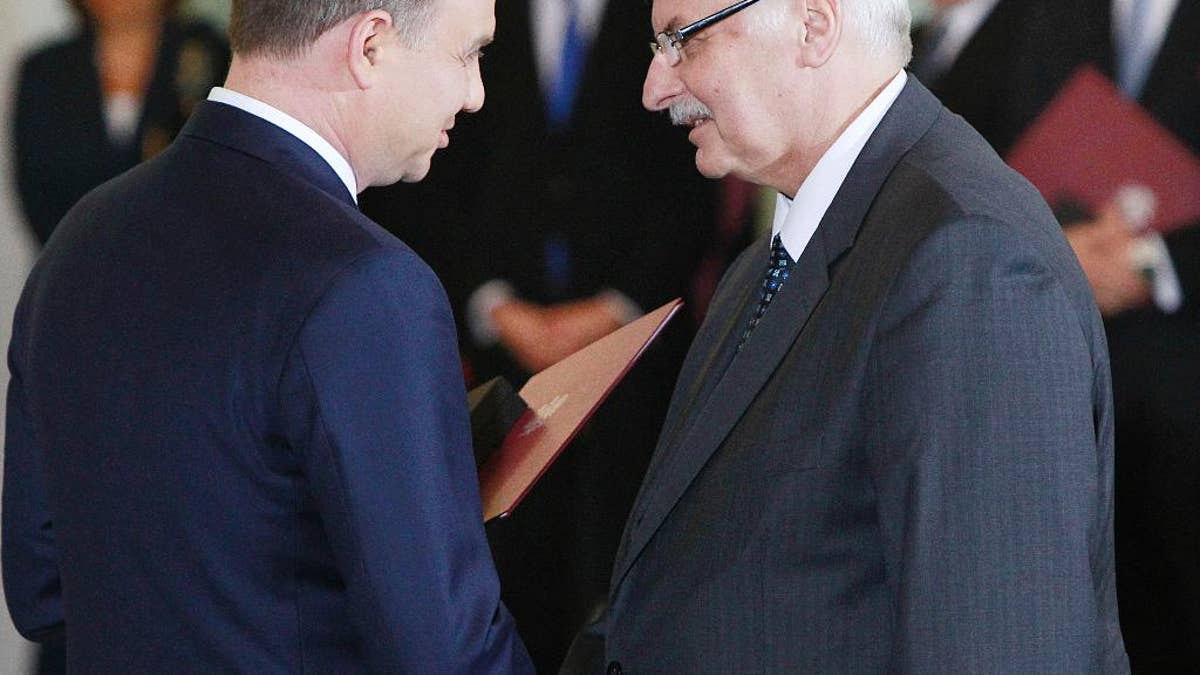
FILE - In this Nov.16, 2015 file photo Poland's President Andrzej Duda , left, congratulates Witold Waszczykowski as he is sworn in as new Polish Foreign Minister during the swearing-in ceremony of the new, conservative government at the Presidential Palace in Warsaw, Poland. Waszczykowski told The Associated Press he welcomes the new cooperation between Russia and the West in the fight against the Islamic State group, but insists that Ukraine's interests cannot be sacrificed as a reward to Moscow for those efforts. (AP Photo/Czarek Sokolowski) (The Associated Press)
WARSAW, Poland – Poland's new foreign minister said Friday that he welcomes the new cooperation between Russia and the West in the fight against the Islamic State group, but insists that Ukraine's interests cannot be sacrificed as a reward to Moscow for those efforts.
In an interview with The Associated Press, Witold Waszczykowski said there is no reason to lift the sanctions against Russia as long as Moscow fails to fulfill its side of the Minsk peace accords, which are aimed at ending the conflict between Ukraine and pro-Russia rebels in eastern Ukraine.
"We are not going to sell Ukraine for Russian assistance to help (in) the Syrian conflict or the IS conflict," he said. "We will still insist on the sanctions because there is no progress in implementing the Minsk agreement."
Waszczykowski belongs to a new government led by the conservative Law and Justice party, whose return to power after eight years in the opposition marks a sharp political change for Poland, the sixth largest economy in the European Union. While Poland has been a staunch U.S. ally since the fall of communism in 1989, the new government is even more staunchly pro-Washington than the previous one — and also takes a harder line toward Moscow.
Waszczykowski, who studied at the University of Oregon in the late 1980s, said his government is "very happy and satisfied" with its relationship with the U.S., especially in military matters. He praised efforts by President Barack Obama's administration to increase the U.S. military presence in Central Europe following Russia's annexation of Crimea and its military incursions into eastern Ukraine.
He said he is also pleased with signals that the U.S. plans to do even more to beef up the security of Poland and its allies — an issue that will be brought up at a NATO summit in Warsaw next summer.
Asked what he hopes most to achieve, Waszczykowski said: "Just to have American soldiers here. Do we call them permanent bases, or permanent presence, or rotational presence? It doesn't matter. As long as they are here, and they cooperate with us and they defend this part of Europe, we will be happy."
The refusal of Russian authorities to return the wreckage and black boxes from a 2010 plane crash in Russia that killed Polish President Lech Kaczynski and 95 other Poles is also straining relations between Warsaw and Moscow.
Russia says it cannot give the objects back because they are still investigating the crash, which both Polish and Russian aviation experts have declared an accident.
Some members of Poland's new ruling party — which is led by Jaroslaw Kaczynski, the twin brother of the late president — dispute the results of those inquiries and suspect foul play by Vladimir Putin's Russia.
"This catastrophe happened almost six years ago and there is no progress. The Russian investigation is not over, they are not cooperating with us, and they are still keeping the wreckage of the plane and the black boxes," he said. "This is our property."
He said it is suspicious given that the wreckage of the Malaysian Airlines plane that went down in eastern Ukraine in 2014 was sent to the Netherlands within a year to be investigated and that the Russian airliner brought down by an IS bomb over Egypt in October was returned to Russia after just two weeks.
The new Polish government, led by Prime Minister Beata Szydlo, has faced criticism — both in Poland and abroad — for some tactics that critics consider heavy-handed, including an attempt to stack the Constitutional Tribunal with party faithful. That has led some to compare Poland under the new government to Hungary under Prime Minister Viktor Orban.
Orban swept to power in 2010 and used his massive majority in parliament to remake the country, undermining the independence of the judiciary and other institutions. He calls his own style of government "illiberal."
But Waszczykowski said he considers comparisons to Orban's Hungary unfair.
____
Follow Vanessa Gera on Twitter at twitter.com/vanessagera




















